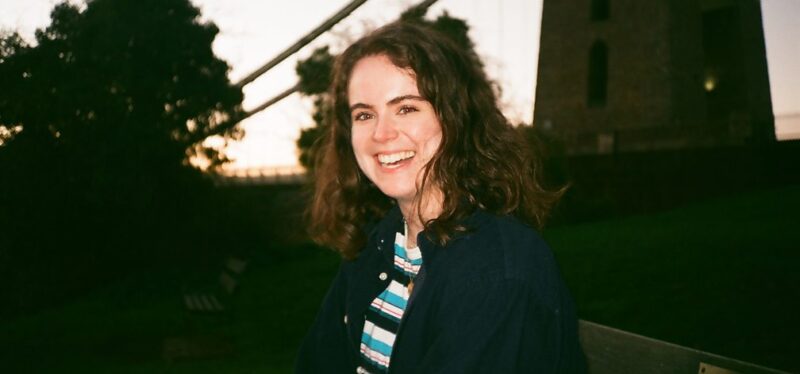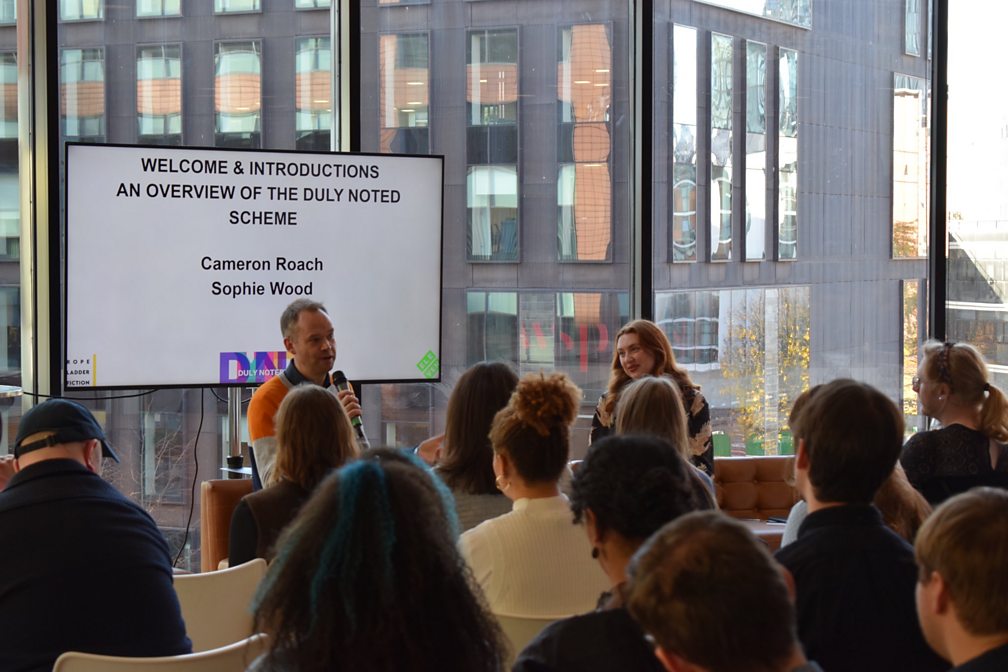From Book Editor to Script Editor…

In her blog for the BBC, Ellie Drewry outlines her pathway from book to script editing and what the disciplines have in common.
Ellie took part in the 2023 Duly Noted scheme, Eleven’s development programme for aspiring script editors, which has opened again for applications this week.
I worked in book publishing for years. When I was a book editor I assessed, commissioned and edited promising manuscripts across genres and formats. Being inquisitive and interrogating writing choices with love and care was my favourite part of my job – making stories the best and the most emotionally impactful they can be.
Before I made the leap from the book industry to scripts via the incredible training of Eleven Film’s Duly Noted programme, the gulf between industries seemed insurmountably large. But I knew that on a core level, my role’s end goal remained the same; asking the public to spend their little free time with characters I help shape and worlds I help build. Supporting writers and shepherding new, impactful stories into the world is a joy!
Attending Duly Noted’s Script Editor Forum in the autumn, hosted by Rope Ladder Fiction and Eleven Film, reminded me that script editors are the custodians of the story. It is our job to remain unflappable under pressure as the bridge between the writer and the production company. It is important to measure the success of an editorial project in not only the final product but in how seen, supported and held each writer feels throughout the process so that they can move on to their next project with more confidence than the last.
Creating books and scripted content is a very similar creative process. Both mediums require intense collaboration and, therefore, stamina – being a writer’s cheerleader through many notes and rewrites and staying true to the original vision is a huge part of being both a book and script editor.
IP development in TV often starts with brilliant source material, and I have found that my foundation in books has helped me understand the adaptation process and what needs to change on a structural level when translating a story across formats. In prose, we can often crack open our protagonist’s head and learn their wants and desires through reading their inner thoughts and learning how they act alone. On screen, we don’t have the luxury of living inside a character.
Working in publishing also exposed me to literary trends. I saw everything from vampires coming back in a huge way (though this time they weren’t sparkly), to themes of ambivalent motherhood, to waves of mythology retellings. Because TV shows and films are, with a few notably huge exceptions, quicker to make and produce than books, being on top of new publishing is a great way to predict the next big thing in TV and film. I’d recommend reading all the major publishers’ catalogues to stay on top of what’s releasing in the next year and a half – most catalogues can be found on each publisher’s website – and to do some research to figure out which publishers and imprints are building a list that aligns with your interests and needs. Interested in prize-winning literary fiction? Try Hutchinson Heinemann. Looking for quality commercial fiction and non-fiction? Try Wildfire.
A huge difference between the book world and the scripted world is that in TV the roles of a development script editor and commissioner are split across different parts of the industry. When I was a book editor, I was both the commissioner and the editor, so I was thinking simultaneously creatively and commercially from the very first read. Which books would this sit beside in a bookshop? How will it stand out in an impossibly saturated market? Which trends can I spot simmering under the surface, waiting for the perfect story to catch and fling them into the mainstream? I think this vigorous and often ruthless assessment criteria has helped me in TV and film to always place the projects I work on in a cultural context.
New visual content in the age of streaming is now competing against the greatest TV shows and films of all time – viewers have the choice between trying a new release that hasn’t yet been reviewed or revisiting something they know. As creators of TV and film, we are competing for people’s time against classics, as they are just as accessible and often just as culturally relevant. Viewers are no longer tuning in to whatever is airing on a Saturday night – everything is accessible, and everything can be revisited.
This is a dynamic book editors know well. I have met so many readers over the years who proudly declare that they only read the ‘classics’ and non-fiction books about self-optimisation – particularly as our education system so often sucks the joy out of books for reluctant readers. Reading is often seen as worthy, and something that we should be doing to grow, so when editing and developing fiction I knew I was competing for people’s time against the Brontës, Austen, Orwell – even though, of course, books can and should be everything from laugh-out-loud funny, to smutty, to gentle, to profoundly moving – so no pressure! The bar for excellence is higher than ever, and helping writers craft the very best version of their idea is a skill set I am very grateful to have honed in publishing and transferred over to TV and film.
Developing a manuscript that will jumpstart joy and create lifelong readers was an amazing part of being an in-house book editor. My years in publishing were accidentally wonderful training for my current role as a script editor because both roles demand a huge amount of emotional intelligence. Writing is hard! And so being a supportive and understanding voice in a sea of rewrites and drafts is essential. Giving notes to a writer that might be challenging to receive requires a deep understanding of the manuscript and how exactly the notes being given will change the story being delivered. Some writers want solutions; some just want a kind but firm nudge in the right direction.

